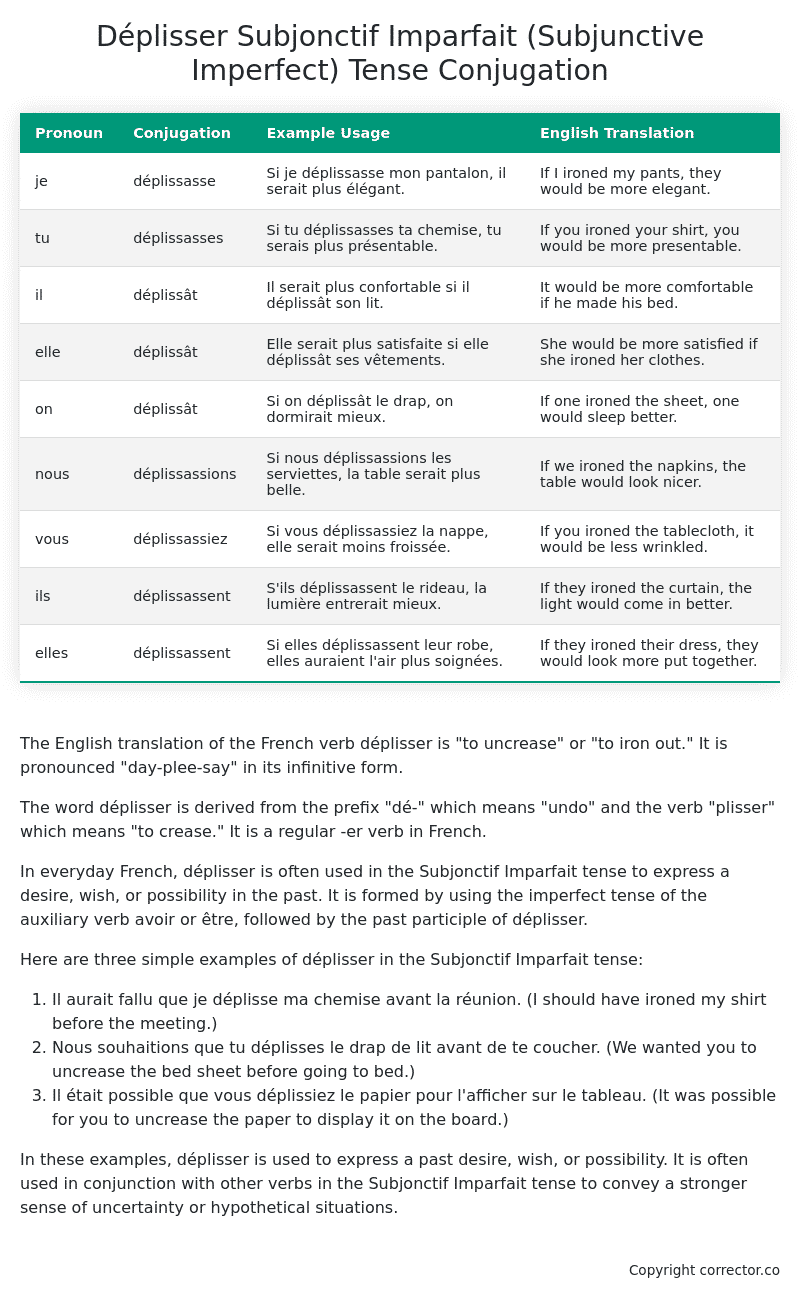Subjonctif Imparfait (Subjunctive Imperfect) Tense Conjugation of the French Verb déplisser
Introduction to the verb déplisser
The English translation of the French verb déplisser is “to uncrease” or “to iron out.” It is pronounced “day-plee-say” in its infinitive form.
The word déplisser is derived from the prefix “dé-” which means “undo” and the verb “plisser” which means “to crease.” It is a regular -er verb in French.
In everyday French, déplisser is often used in the Subjonctif Imparfait tense to express a desire, wish, or possibility in the past. It is formed by using the imperfect tense of the auxiliary verb avoir or être, followed by the past participle of déplisser.
Here are three simple examples of déplisser in the Subjonctif Imparfait tense:
- Il aurait fallu que je déplisse ma chemise avant la réunion. (I should have ironed my shirt before the meeting.)
- Nous souhaitions que tu déplisses le drap de lit avant de te coucher. (We wanted you to uncrease the bed sheet before going to bed.)
- Il était possible que vous déplissiez le papier pour l’afficher sur le tableau. (It was possible for you to uncrease the paper to display it on the board.)
In these examples, déplisser is used to express a past desire, wish, or possibility. It is often used in conjunction with other verbs in the Subjonctif Imparfait tense to convey a stronger sense of uncertainty or hypothetical situations.
Table of the Subjonctif Imparfait (Subjunctive Imperfect) Tense Conjugation of déplisser
| Pronoun | Conjugation | Example Usage | English Translation |
|---|---|---|---|
| je | déplissasse | Si je déplissasse mon pantalon, il serait plus élégant. | If I ironed my pants, they would be more elegant. |
| tu | déplissasses | Si tu déplissasses ta chemise, tu serais plus présentable. | If you ironed your shirt, you would be more presentable. |
| il | déplissât | Il serait plus confortable si il déplissât son lit. | It would be more comfortable if he made his bed. |
| elle | déplissât | Elle serait plus satisfaite si elle déplissât ses vêtements. | She would be more satisfied if she ironed her clothes. |
| on | déplissât | Si on déplissât le drap, on dormirait mieux. | If one ironed the sheet, one would sleep better. |
| nous | déplissassions | Si nous déplissassions les serviettes, la table serait plus belle. | If we ironed the napkins, the table would look nicer. |
| vous | déplissassiez | Si vous déplissassiez la nappe, elle serait moins froissée. | If you ironed the tablecloth, it would be less wrinkled. |
| ils | déplissassent | S’ils déplissassent le rideau, la lumière entrerait mieux. | If they ironed the curtain, the light would come in better. |
| elles | déplissassent | Si elles déplissassent leur robe, elles auraient l’air plus soignées. | If they ironed their dress, they would look more put together. |
Other Conjugations for Déplisser.
Le Present (Present Tense) Conjugation of the French Verb déplisser
Imparfait (Imperfect) Tense Conjugation of the French Verb déplisser
Passé Simple (Simple Past) Tense Conjugation of the French Verb déplisser
Passé Composé (Present Perfect) Tense Conjugation of the French Verb déplisser
Futur Simple (Simple Future) Tense Conjugation of the French Verb déplisser
Futur Proche (Near Future) Tense Conjugation of the French Verb déplisser
Plus-que-parfait (Pluperfect) Tense Conjugation of the French Verb déplisser
Passé Antérieur (Past Anterior) Tense Conjugation of the French Verb déplisser
Futur Antérieur (Future Anterior) Tense Conjugation of the French Verb déplisser
Subjonctif Présent (Subjunctive Present) Tense Conjugation of the French Verb déplisser
Subjonctif Passé (Subjunctive Past) Tense Conjugation of the French Verb déplisser
Subjonctif Imparfait (Subjunctive Imperfect) Tense Conjugation of the French Verb déplisser (this article)
Subjonctif Plus-que-parfait (Subjunctive Pluperfect) Tense Conjugation of the French Verb déplisser
Conditionnel Présent (Conditional Present) Tense Conjugation of the French Verb déplisser
Conditionnel Passé (Conditional Past) Tense Conjugation of the French Verb déplisser
L’impératif Présent (Imperative Present) Tense Conjugation of the French Verb déplisser
L’infinitif Présent (Infinitive Present) Tense Conjugation of the French Verb déplisser
Struggling with French verbs or the language in general? Why not use our free French Grammar Checker – no registration required!
Get a FREE Download Study Sheet of this Conjugation 🔥
Simply right click the image below, click “save image” and get your free reference for the déplisser Subjonctif Imparfait tense conjugation!

Déplisser – About the French Subjonctif Imparfait (Subjunctive Imperfect) Tense
Formation
Common Everyday Usage Patterns
Interactions with Other Tenses
Subjonctif Présent
Indicatif Passé Composé
Conditional
Conditional Perfect
Summary
I hope you enjoyed this article on the verb déplisser. Still in a learning mood? Check out another TOTALLY random French verb conjugation!


